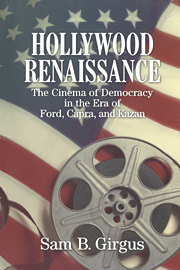Book contents
- Frontmatter
- Contents
- List of Illustrations
- Acknowledgments
- 1 Ethnics and Roughnecks: The Making of the Hollywood Renaissance
- 2 A Cinema for Democracy: John Ford and the Crisis of Modernity, Myth, and Meaning
- 3 Gender and American Character: Frank Capra
- 4 Revisioning Heroic Masculinity: From Ford to Hawks and Zinnemann
- 5 An American Conscience: Elia Kazan's Long Journey Home
- 6 Losing Tomorrow: George Stevens and the American Idea
- 7 Conclusion: Film and America after the Hollywood Renaissance
- Notes
- Filmography
- Index
1 - Ethnics and Roughnecks: The Making of the Hollywood Renaissance
Published online by Cambridge University Press: 05 June 2012
- Frontmatter
- Contents
- List of Illustrations
- Acknowledgments
- 1 Ethnics and Roughnecks: The Making of the Hollywood Renaissance
- 2 A Cinema for Democracy: John Ford and the Crisis of Modernity, Myth, and Meaning
- 3 Gender and American Character: Frank Capra
- 4 Revisioning Heroic Masculinity: From Ford to Hawks and Zinnemann
- 5 An American Conscience: Elia Kazan's Long Journey Home
- 6 Losing Tomorrow: George Stevens and the American Idea
- 7 Conclusion: Film and America after the Hollywood Renaissance
- Notes
- Filmography
- Index
Summary
From our distant perspective at the end of the twentieth century, the outcome of events from the Great Depression through the Second World War to the origins of the Cold War all seems inevitable and predestined: the midcentury triumph over fascism and totalitarianism in Europe and Asia; the dissolution of extremist parties of hatred and animosity on the left and right within our own country during and after the depression; the emergence in America of a liberal state blending welfare paternalism with corporate and entrepreneurial capitalism; the unprecedented growth of a prosperous and comfortable middle class; the strengthening of individual and group rights after a tumultuous if exhilarating civil rights movement; and the eruption of marginalized groups and minorities into the mainstream of American democracy.
To F. O. Matthiessen in the late 1930s, however, the times seemed precarious indeed. Democracy appeared to be more endangered from forces both within and without than at any period since the Civil War. Matthiessen saw before him American values and institutions challenged by an ever-widening array of enemies and forces. Overseas the threat of totalitarianism grew ever closer and increasingly menacing, while at home the continuing depredations of unemployment, inequality, and injustice cultivated movements and causes of incipient fascism and communism. To Matthiessen, therefore, the future seemed filled with uncertainty.
- Type
- Chapter
- Information
- Hollywood RenaissanceThe Cinema of Democracy in the Era of Ford, Kapra, and Kazan, pp. 1 - 18Publisher: Cambridge University PressPrint publication year: 1998



